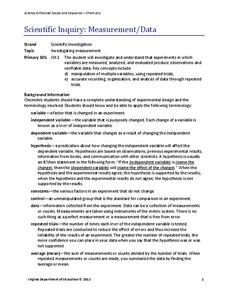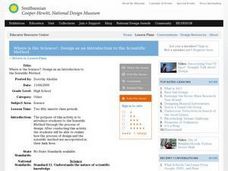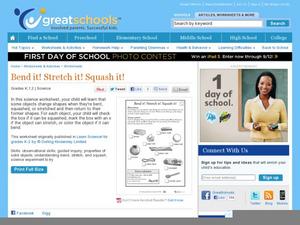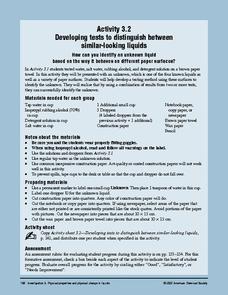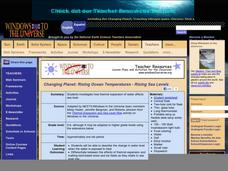Curated OER
Hey, I've Got A Question!
Seventh graders explore the Solar System. They develop a research question and use inquiry-based research skills to find the answers to their questions. Students write up their findings and create a multimedia presentation.
Virginia Department of Education
Scientific Inquiry: Measurement/Data
While pupils design their own lab experiments, they will not form a new species. Scholars take their materials and design an experiment regarding reaction rates.
Curated OER
Where is the Science?: Design as an Introduction to the Scientific Method
Students work to create a design that will protect an egg from being dropped from a one story floor. They test their prototype after it is completed. They write clear instructions and link aspects of the design process to the scientific...
Pyro Innovations
Beach Exploration
Little ones will absolutely love this lesson. It's all about the beach and what they can find while sifting through the sand. A large bucket of sand filled with hidden items is brought into the classroom. Learners will discuss what kinds...
Curated OER
Using Java Applets for Inquiry-Based Physics Lessons
Using Java Applets in the physics classroom can be a great way to reinforce scientific concepts.
Curated OER
Top 10 Summer Science Lesson Plans
Make this summer an exciting learning experience for your students with these engaging science activities!
PHET
Measuring the Interplanetary Magnetic Field
Scientists need to figure out how to measure interplanetary magnetic fields, but the magnetic field of the spacecraft is interfering with their readings. Scholars attempt to solve the problem that has perplexed NASA scientists for years.
Science 4 Inquiry
Monster Mash-Up of Genetics
It's alive! Young mad scientists create monsters as they explore the probabilities of genetic traits during a well-structured inquiry lesson. Pairs travel from station to station, rolling the dice and adding traits to their creations as...
Curated OER
Bend It! Stretch It! Squash It!
Some items keep their shape no matter what happens! Have your kindergarten class choose which items would stay the same if they were bent, stretched, or squashed. The last activity prompts kids to see what happens when they stretch a...
Curated OER
Growing
Growing is part of being a living thing. Kindergartners decide which illustrations represent the life cycle of a living thing, then put a check mark next to the correct pictures. They then examine their own growth on a height chart.
Curated OER
Understanding the Cosmic Microwave Background (CMB)
How did our universe really begin? Explore the Science Big Bang Theory and Cosmic Microwave Background (CMB) with this multiple activity-based lesson that demonstrates that the increase of density due to the decrease of temperatures,...
Odyssey of the Mind
Odyssey of the Mind Curriculum Activity: From a Distance
Challenge your class with an amazing set of ideas that really put the project back into project-based learning. It all starts with a whole class research task. Each learner will look up and take notes on multiple facets of things that...
Chemistry Collective
Virtual Lab: DNA Binding Problem
Why do the bases in DNA pair up the way they do? Unravel the mystery of the double helix in a virtual lab. Young scientists follow in the footsteps of Watson and Crick to determine the free energy associated with DNA base pair binding....
Curated OER
Crazy for Cubes: Art and Science
Learners discuss Sol LeWitt and conceptual art, then analyze the differences in expressing a concept through model-based inquiry and aesthetic art criticism. They develop a geometric, scientific, or mathematical concept, then create an...
Nevada Outdoor School
Let It Snow! Let It Melt!
Winter weather offers a great opportunity to teach young scientists about the states of matter. This activity-based lesson includes a range of learning experiences, from experimenting with the rate at which ice melts to singing a song...
National Science Teachers Association
Hop into Action
Young scientists find out what makes amphibians such unique and interesting animals in this simple life science lesson. After looking at pictures and discussing the characteristics of amphibians, learners complete a series of three Venn...
American Chemical Society
Developing Tests to Distinguish Between Similar-Looking Liquids
Each group talks about how to test unknown liquids based on their findings in the previous experiment. In this second of four activities, they test unknowns on wax paper, newspaper, and construction paper. As a stand-alone, this lesson...
PBS
Cloud Clues
It's cloudy with a good chance of learning! An inquiry-based lesson begins with an exploration of transparent, translucent, and opaque materials. Young scientists then connect their learning to the different cloud types as they take the...
NASA
Measuring Solar Energy During an Eclipse
Don't leave your classes in the dark! An inquiry-based lesson has young researchers analyze the light intensity before, during, and after a solar eclipse. They use their data to make inferences about the solar energy available during...
Curated OER
Look At Those Leaves!
Learners collect, measure and classify leaves. In this inquiry-based sorting and classifying lesson, students look at various types of leaves they have collected and measure them using a standard unit of measurement. Next, they relate...
Curated OER
Archaeological Inquiry
Young scholars describe what they see as they observe an "artifact". They draw conclusions based on the information gathered to identify what the artifact might be used for and determine how old it might be.
Curated OER
Finding Science in An American Childhood by Annie Dillard
Young scholars read excerpts from Annie Dillard's memoir, "An American Childhood," with the teacher. They experience opportunities to connect English, science, nature and art together from a new and unique perspective. This approach...
Curated OER
Changing Planet: Rising Ocean Temperatures - Rising Sea Levels
As an anticipatory set, young environmental technicians watch a video about how ocean temperatures seem to be changing along with the global climate. They perform a laboratory demonstration with the purpose of observing what happens to...
Baylor College
What Dissolves in Water?
One of water's claims to fame is as the universal solvent. Young physical scientists experiment to discover which materials dissolve in this special compound. You could never be more prepared for teaching this lesson plan than by using...
Other popular searches
- Inquiry Based Science Lessons
- Inquiry Based Science Water
- Science Inquiry Based
- Inquiry Based Science Lessons
- Inquiry Based Science Sose
- Inquiry Based Science Souse
- Science Inquiry Based Learning



